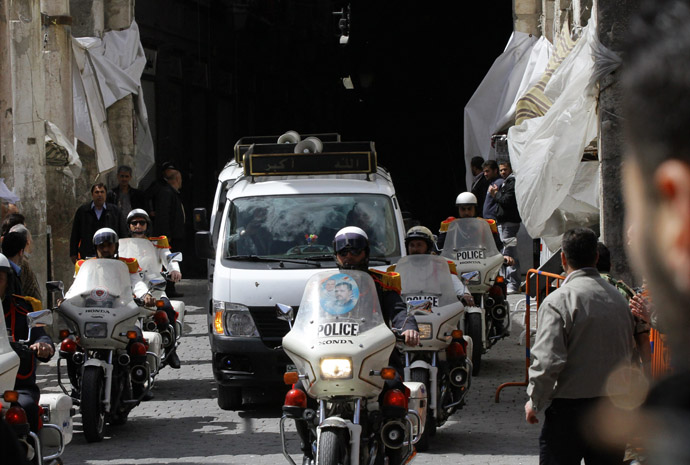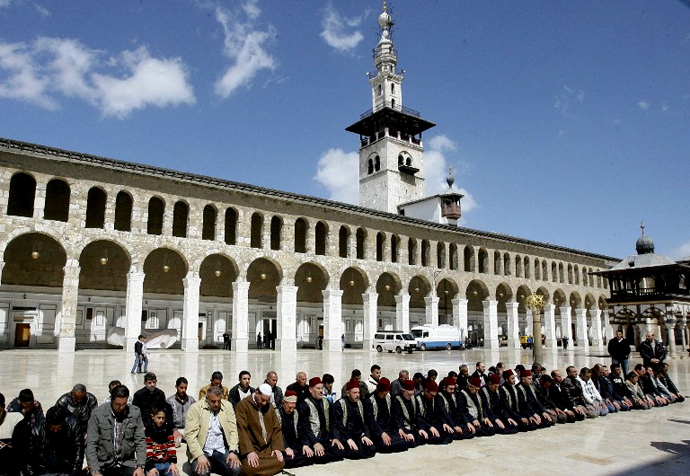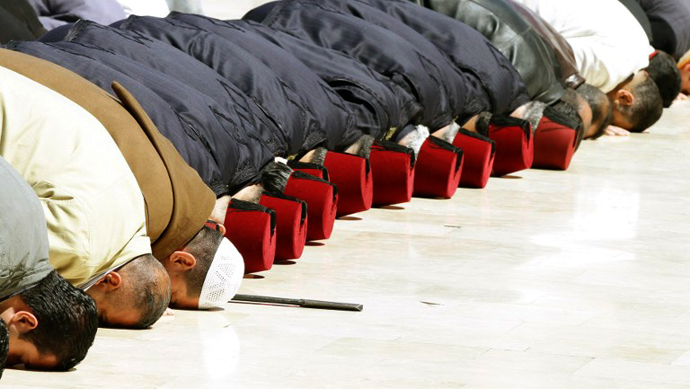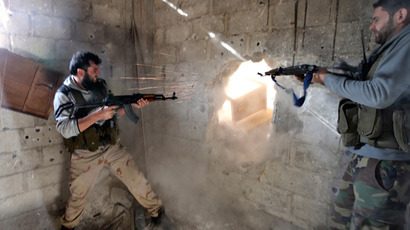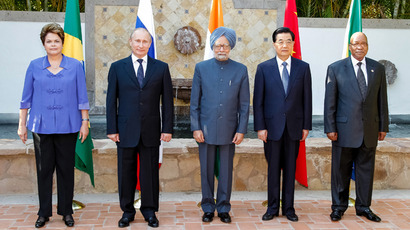Thousands gather in Damascus for funeral of assassinated Syrian cleric (VIDEO)
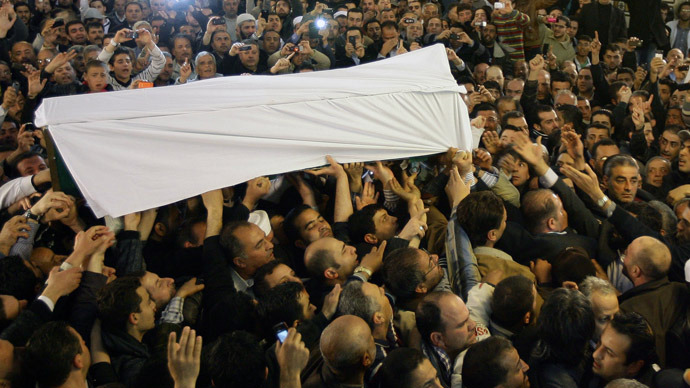
Thousands of Syrians have gathered for the funeral of a pro-Assad cleric who was killed in a blast at a mosque earlier this week. Saturday has been declared a day of mourning in the Arab country.
Mohammed Saeed Ramadan Al-Bouti, his grandson, and 49 others
were killed when a suicide bomber detonated a bomb inside a mosque
where he was delivering a sermon on Thursday.
The cleric was Imam of the Omayyad Mosque, a Damascus landmark. He
is the most senior religious figure to be killed in the Syrian
conflict to date.
During the funeral, mourners carried 84-year-old Mohammad Said
Ramadan al-Bouti’s coffin on their shoulders while shouting “God
is Great.”
The cleric was buried on grounds beside the tomb of the Saladin,
regarded as a heroic warrior in Islam. The move angered opposition
activists, who turned to social media to express their fury.
"Burying Buti next to Saladin is a deliberate insult,"
activist Waleed al-Akrat wrote on Twitter.
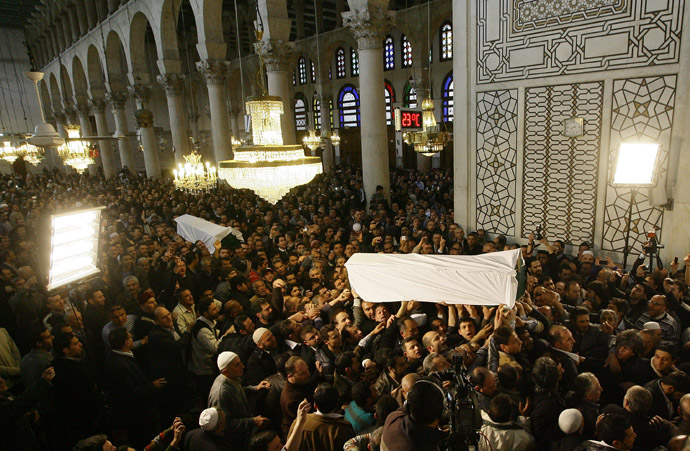
Syrian President Bashar Assad was being represented at the
funeral by one of his cabinet ministers, according to state TV. On
Friday, the Syrian leader vowed to "cleanse" his country of
“extremists,” whom he accused of being behind the attack.
"I swear to the Syrian people that your blood, and that of your
grandson and all the martyrs of the homeland, will not be spilled
in vain because we will be faithful to your ideas by destroying
their extremism and ignorance until we have cleansed the
country," Assad said in an official statement.
The slain cleric had been a vocal supporter of the Syrian regime
since the days of Assad’s father and predecessor. In a speech
earlier this month, al-Bouti said it was “a religious duty to
protect the values, the land and the nation” of Syria. He
previously referred to Assad's opponents as "scum.”
According to a local journalist, who requested anonymity, it was
those statements that prompted the opposition to carry out the
attack.
“We believe the opposition is responsible for this. We have
Islamist extremist groups – jihadis – who are fighting against the
government. Mr. al-Bouti, before he was killed, in his last speech
on Friday, said we should fight with the Syrian army and not the
opposition groups so this raised a lot of controversy…and
discussion in Syrian society and led to this killing,” he told
RT.
But the opposition has also condemned the attack, pointing the
finger at the Assad regime. The current head of the National Syrian
Coalition, Moaz Alkhatib, said on his Facebook page that only the
Syrian government could be behind the attack, stressing the
importance that places of worship and clerics not be targeted.
"The killing of Doctor al-Bouti is a crime in every sense of the
word," he wrote. "No matter the differences that clerics in
Syria may have in their view of the situation, this does not allow
for the merciless killing of Muslims or the defilement of
mosques."
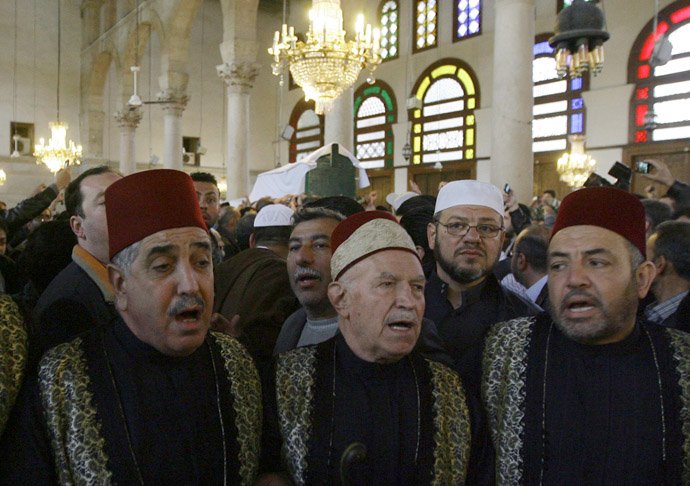
A ‘biased and imbalanced’ UN
Also on Saturday, Assad’s regime said it rejected a UN Human Rights
Council decision to continue an investigation of “alleged
violations of international human rights law.” An unnamed
official told SANA news agency that the group’s work is “biased and
imbalanced.”
The comment comes a day after the UN Human Rights Council passed
the resolution, which the official said doesn’t take into account
“the unethical role played by states that sponsor terrorism in
Syria, which fund, train, arm and send terrorists and
mercenaries” into the country.
He added that the resolution reflects “a policy of double
standards practiced by some countries that claim to defend human
rights.”
The resolution was adopted with 41 votes in favor, one against, and
five countries abstaining. It strongly condemned violence on both
sides, but noted that those “committed by anti-government armed
groups did not reach the intensity and scale of the violations
committed by the government forces and its affiliated
militia.”
Meanwhile, European Union Foreign Policy chief Catherine Ashton
says there is a real sense of urgency to ensure political progress
in Syria.
The comment came during a meeting of EU foreign ministers at Dublin
Castle. The two-day talks failed to find a common position on the
future of the EU’s Syrian arms embargo.
France and Britain believe that lifting the embargo would raise
pressure on Assad to negotiate an end to the civil war, which has
led to the deaths of an estimated 70,000 people.
Other EU countries disagree, saying that lifting the embargo would
lead to weapons falling into the hands of Islamist militants, as
well as fuel regional conflict and encourage Assad’s backers to
step up arms supplies to the leader.
The EU has until June 1 to decide whether to renew or amend its
sanctions on Syria. Changing the arms ban needs the backing of all
27 EU states.
